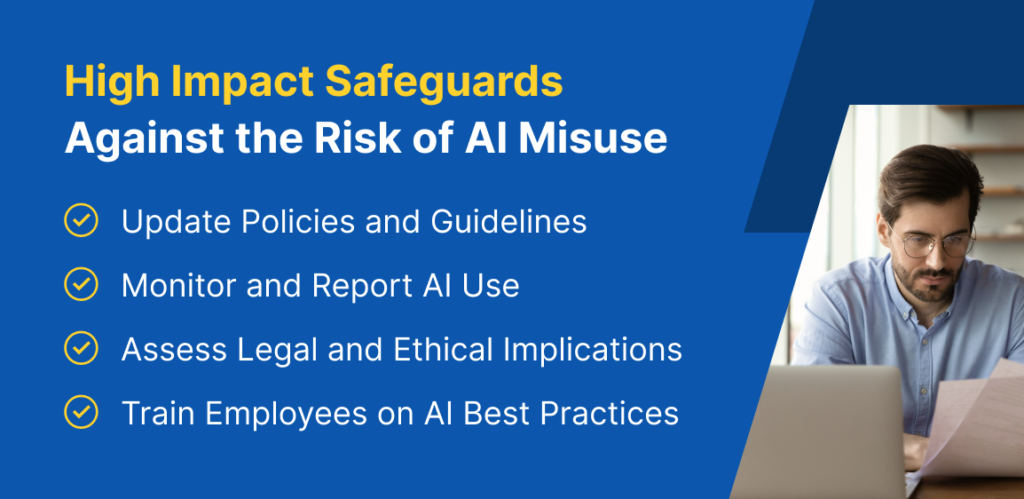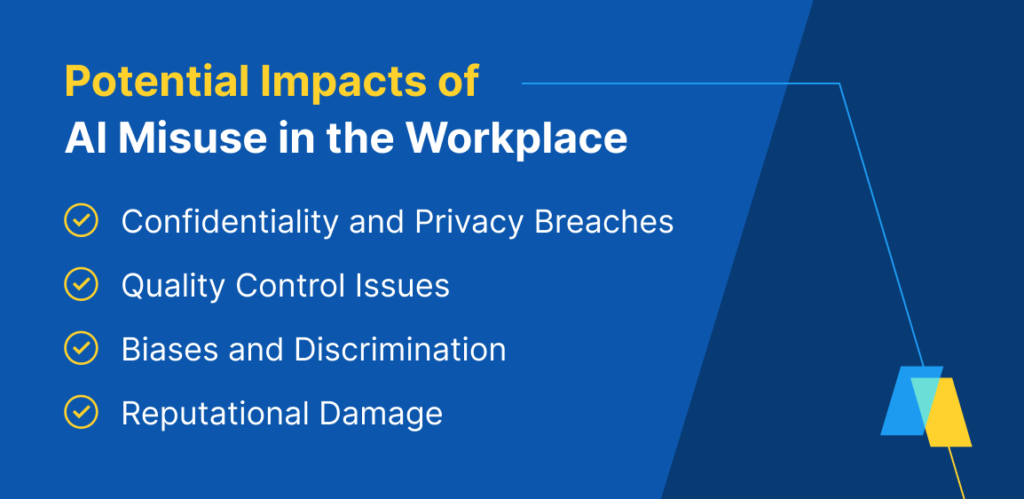AI solutions, like ChatGPT, offer businesses immense opportunities but also present substantial risks related to inappropriate AI use by employees. Key areas of concern include confidentiality breaches, accuracy issues, biased predictions, and reputational damage. Mitigating strategies encompass establishing clear data-sharing policies, having human reviews for AI outputs, conducting proactive bias assessments, and standing firmly against ethical missteps.
To safeguard your business against AI misuse, integrate a robust set of safeguards, including well-defined policies, vigilant monitoring, regular assessments, and comprehensive employee training. This comprehensive approach ensures confidentiality, accuracy, fairness, and trust are promoted alongside innovation in AI use within your business.
The Impact of AI Misuse in the Workplace
The rise of AI technologies like ChatGPT presents new business opportunities and risks. Without proper safeguards and oversight, employees’ use of AI tools could lead to confidentiality, accuracy, bias, and reputation issues. Let’s explore some of the potential impacts to a business if clear oversight and processes are not followed:

Confidentiality and Privacy Breaches
Sharing sensitive company or client data with public AI systems creates significant confidentiality risks. Sharing could violate contractual obligations or expose proprietary information like trade secrets. Personal data shared with AI tools also risks privacy violations or noncompliance with regulations like GDPR.
To mitigate confidentiality risks, companies need clear policies on what data can and can’t be shared with AI systems. Procedures for reporting any inadvertent data sharing are also advised. Limiting the use of personal devices and accounts for work-related AI activities further reduces risks.
Quality Control Issues
AI outputs are only sometimes accurate, so overreliance on them can lead to quality control problems. The issue of “automation bias,” where users trust AI outputs without verifying them, exacerbates this risk.
To address accuracy concerns, companies should require human review of any high-stakes AI outputs before acting on them. Training on responsible AI use and mitigating automation bias is also recommended.
Biases and Discrimination
Biased data or algorithms can lead AI systems to make discriminatory or unfair recommendations about employees. This could create an unlevel playing field or introduce bias into employment decisions.
Organizations must proactively assess AI systems for potential biases and unfair impacts on protected groups. Diversity and inclusion leaders should be involved in AI oversight processes.
Reputational Damage
Public backlash can result if businesses use AI unethically or inappropriately. AI missteps like privacy breaches could also hurt brand reputation.
Maintaining high ethical standards, aligning AI use with company values, and keeping consumers informed are essential for managing reputational risks.
With prudent policies, practical training, and ongoing vigilance, companies can tap into AI while safeguarding against misuse. However, as technologies and regulations evolve, organizations must stay adaptable. The key is striking the right balance – where employees feel empowered to use AI responsibly, and businesses can innovate while protecting confidentiality, accuracy, fairness, and trust.
How to Safeguard Your Business Against the Risk of Employee AI Misuse
Businesses should implement safeguards across policies, monitoring, assessments, and training to harness AI’s potential while mitigating risks. Let’s review a few high-impact safeguards:

Update Policies and Guidelines
Clear, acceptable use policies and guidance are essential for proper AI use. Key policy updates include:
- Prohibiting unauthorized sharing of sensitive data to maintain confidentiality
- Requiring review of AI outputs to catch inaccuracies
- Limiting AI use for high-risk decisions, where mistakes could seriously harm people
Monitor and Report AI Use
Ongoing oversight helps companies track how AI is being used internally:
- Dedicated teams can monitor usage across the organization
- Anonymous reporting systems allow flagging confidentiality breaches or other issues
Assess Legal and Ethical Implications
Regular assessments help align AI use with ethics and regulations:
- Evaluate data practices for compliance with laws like GDPR
- Conduct impact assessments where AI could significantly affect people
- Ensure AI aligns with company principles of fairness and transparency
Train Employees on AI Best Practices
Education enables employees to use AI responsibly:
- Provide guidance on avoiding bias, maintaining accuracy, and other best practices
- Train non-AI users to prevent potential discrimination
- Foster a culture focused on using AI ethically and safely
With thoughtful policies, oversight, assessments, and training, companies can tap AI’s potential while proactively managing risks.
TeamAI Provides Oversight Capabilities that ChatGPT Does Not
AI brings valuable opportunities for efficiency and innovation. However, it also poses risks around bias, accuracy, and ethical implications that must be addressed. With prudent policies, training, and oversight, companies can tap into AI’s potential while safeguarding stakeholders. Vigilance is required, but AI can be harnessed responsibly.
The ideal approach is nuanced – neither banning AI outright nor rushing into adoption. A thoughtful, balanced strategy allows companies to leverage AI safely and effectively.
TeamAI is an excellent solution for most businesses as it provides the ability to create team workspaces that can be monitored by leadership. You can review team use, maintain an approved prompt library, and complete quality assurance monitoring.

